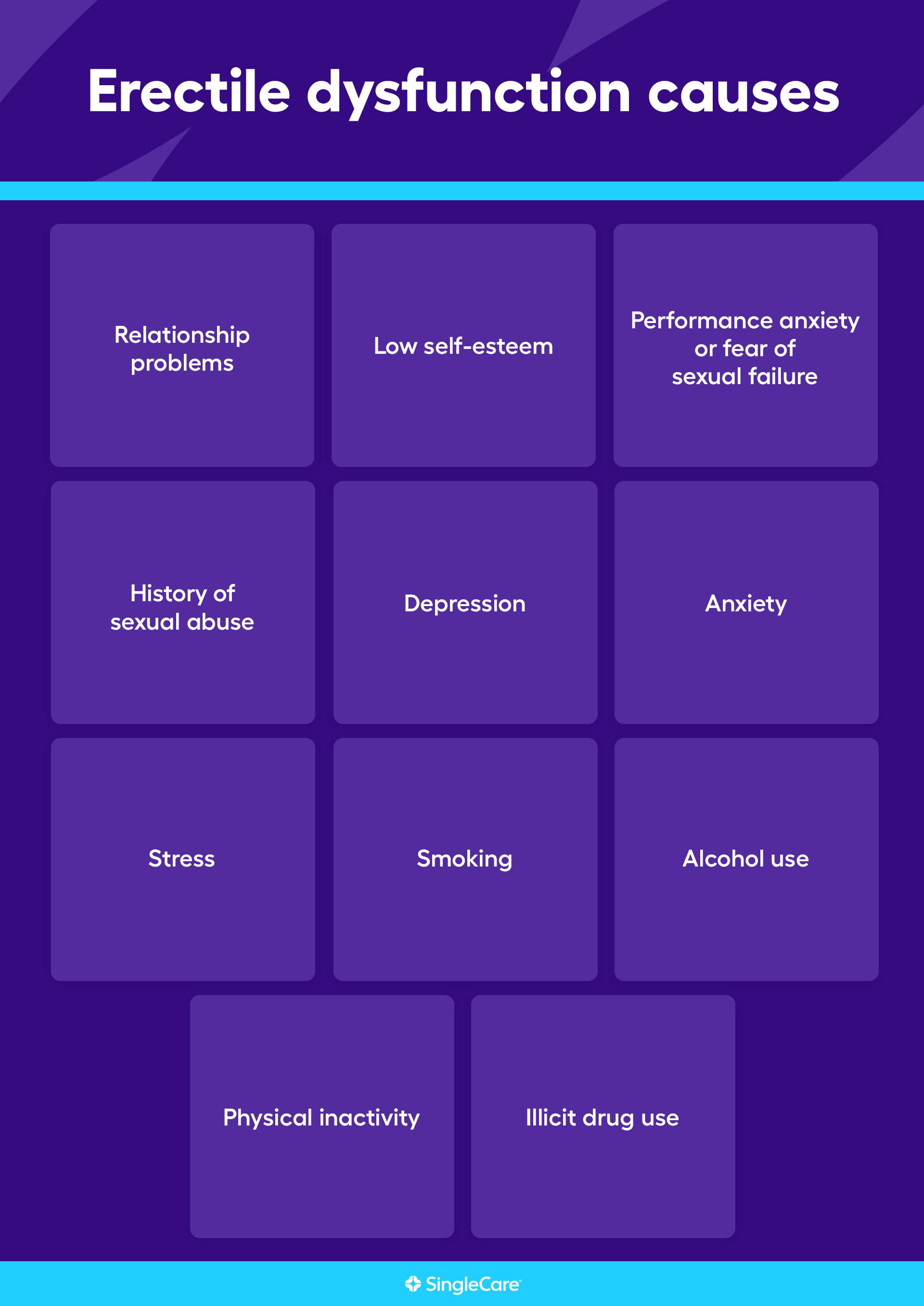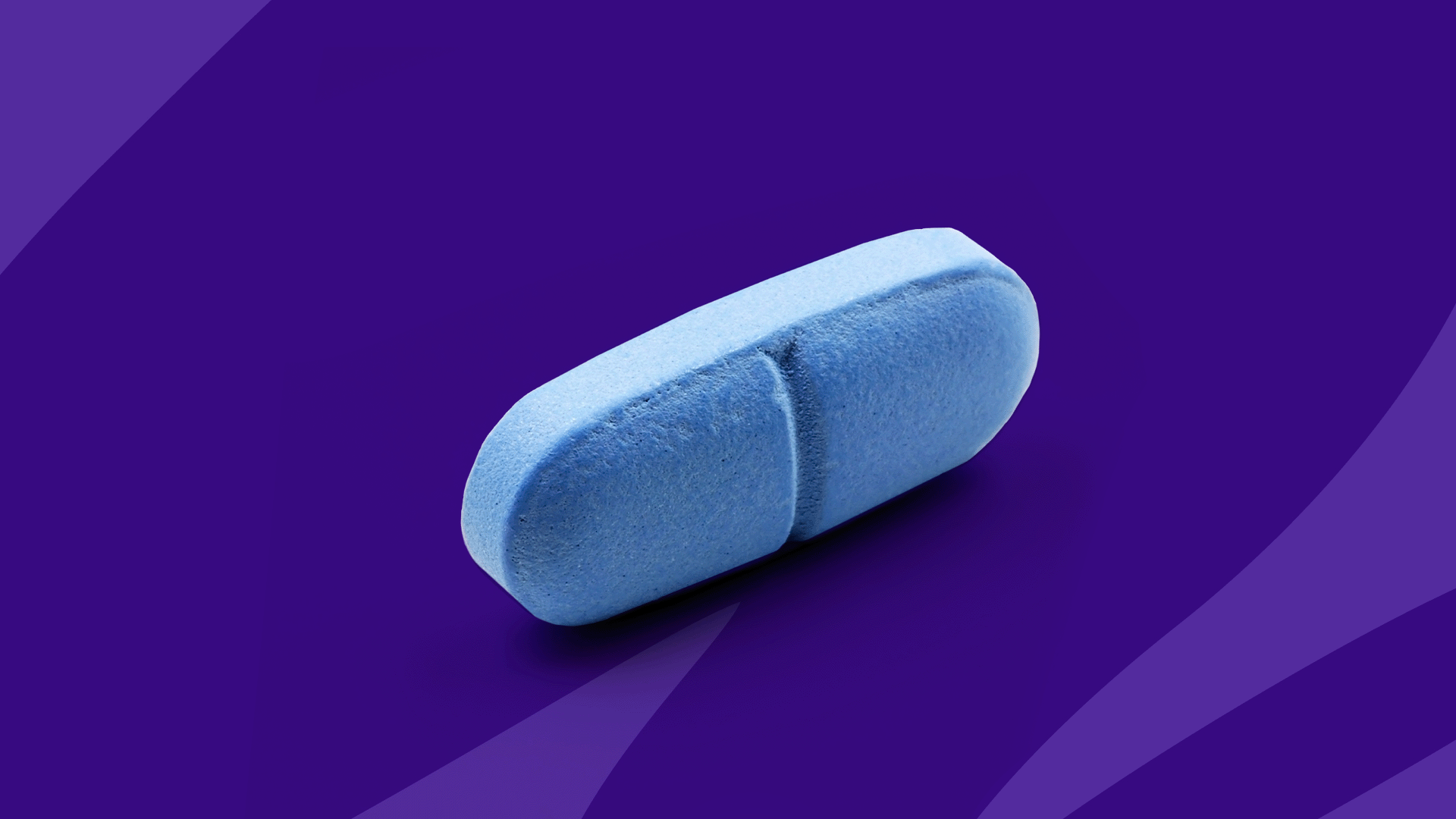Overview: What is erectile dysfunction?
Erectile dysfunction (ED) occurs when men either do not have sufficiently rigid erections or cannot maintain erections long enough to have satisfactory sexual experiences. Though more common in older men, young men can also have erectile dysfunction. Although ED is not health-threatening, it can be emotionally distressing for the man and his partner and reduce the overall quality of life. ED may be a precursor to more severe health problems such as coronary artery disease. For this reason, men with ED should talk to a healthcare professional.
What causes erectile dysfunction?
Erectile dysfunction has many causes. Most cases involve more than one. These causes may be psychological, lifestyle-related, physical, or due to medication side effects.

One study concluded that psychological issues cause up to 40% of erectile dysfunction problems. Keep in mind that physical causes are usually also involved. Psychological problems that cause ED can be general, like depression, or specific, like relationship problems. The most common psychological causes of ED include:
Lifestyle habits also cause or contribute to ED, mainly:
Smoking
Alcohol use
Physical inactivity
Illicit drug use
Some medical conditions can cause or contribute to erectile dysfunction. These include:
Some people with ED may have a physical problem with their penis, such as:
Peyronie’s disease (scarring and deformity of the penis)
Injury to the penis
Genital pain
Nerve damage
Inability of the veins to retain blood in the penis
Complications of priapism (a painful, prolonged erection that can be damaging)
Erectile dysfunction is a side effect of some medications including:
Risk factors for erectile dysfunction
The most significant risk factor is age. ED primarily affects men older than 40.
Other than age, the most significant risk factors include:
Hypertension
High cholesterol
Metabolic syndrome
Low testosterone
Diabetes
Lower urinary tract problems
Smoking
Alcohol abuse
Physical inactivity
Obesity
Diets low in whole-grain foods, vegetables, and fruits
Diets high in red meat, dairy products, and sugar
Is erectile dysfunction serious? When to see a doctor
Erectile dysfunction is not a serious health threat, but it can decrease a man’s quality of life and sex life. It can cause distress, depression, anxiety, and relationship problems. However, ED can also be an early sign of a more serious problem: atherosclerosis, the buildup of cholesterol and fatty plaques in the arteries. The penis may be one of the first symptomatic sites of atherosclerosis because its arteries are small. At more advanced stages, atherosclerosis can block the blood flow in the larger arteries feeding the heart, a condition called coronary artery disease. This increases the risk of heart disease, chest pain, and heart attack. ED often occurs two to five years before coronary artery disease. Because of this association, men should see a primary care doctor about ED just in case.
RELATED: How to find an erectile dysfunction doctor and what to expect
How is erectile dysfunction diagnosed?
A diagnosis starts with a medical history, sexual history, and physical examination. The healthcare provider will need to know about medications and supplements, relationship issues with your partner, and lifestyle habits such as smoking or drinking. Some doctors may request to talk to both you and your partner at the same time.
Questions about history of sexual health will be very personal, so expect to answer questions like:
When did the problem start?
Did the problem start gradually over time or all at once?
What changed in your life?
Is the erection problem about getting hard, staying hard, or both?
How hard are your erections on a 0 to 100 scale, with 50 just enough for penetration?
How long do erections typically last?
At what point during sexual intercourse does your penis lose its rigidity?
Are erections better with your partner or other partners?
Are erections better when you masturbate?
Are there problems with orgasms or premature ejaculation during sexual activity?
Do you have spontaneous erections in the morning? At night?
Does the rigidity of your erections vary throughout the day?
Has your sexual desire changed?
How often do you want to have sex? How often does your partner want to have sex?
In a physical examination, the doctor will look for signs of blood vessel problems, heart problems, and low testosterone. If the doctor suspects a heart problem, a full cardiovascular examination may be needed. In many cases, the doctor may send people to see a mental health professional for evaluation.
Blood tests cannot test for ED, but they’re useful for figuring out if there’s an underlying problem such as diabetes, high cholesterol, low testosterone, thyroid problems, or sickle cells. There are specialized tests that can be performed on the penis, but they are usually used only in certain cases.
RELATED: Diagnosing erectile dysfunction: tests & next steps
Is erectile dysfunction hereditary?
Heredity may have some role in erectile dysfunction, but it may not be that relevant. A twenty-year-old study on twins determined that the influence of genetics on ED is about 29%-36%. A recent study found a single genetic mutation that may be predictive of erectile dysfunction. However, any particular case of erectile dysfunction has several causes contributing to the problem. No two cases are necessarily alike. For this reason, healthcare professionals don’t consider genetics to be a critical factor in diagnosing or treating ED.
Is erectile dysfunction curable?
Erectile dysfunction is treatable, but the level of improvement will vary depending on the underlying causes and the person’s commitment to treatment. Because many different factors typically cause dysfunction, treatment will vary by patient. Treatment options include:
Treatment usually improves erectile dysfunction, sometimes dramatically. However, for some men, erectile function may not fully return. The healthcare provider and the patient will need to discuss acceptable treatment goals.
RELATED: Erectile dysfunction treatments and medications
How to prevent erectile dysfunction
Most healthcare professionals believe lifestyle changes have a prominent role in preventing and treating erectile dysfunction to improve sexual performance. Some think lifestyle is more fundamental to the problem. The European Association of Urology advises doctors that lifestyle changes should precede any medical treatment.
A few things have been shown by research to improve or prevent ED:
Weight loss—one study found that men who are obese are 50% more likely to have erectile dysfunction than men of average weight.
Smoking cessation
Reducing alcohol intake
Exercise for at least 30 minutes a day
A diet high in whole-grain foods, legumes, vegetables, and fruits
A diet low in red meat, whole-fat dairy products, and sugary foods
Stress management
RELATED: 12 foods that help ED—and 3 to avoid
FAQs about erectile dysfunction causes
What causes erectile dysfunction in older males?
Erectile dysfunction primarily is a men’s health issue occurring in men older than 40. It can be caused by relationship issues, psychological problems, lifestyle habits, medical conditions, and drugs. Some causes, like medication side effects, may be easy to fix. Other causes, like relationship issues, may be more difficult and time-consuming to fix.
What causes erectile dysfunction in young males?
About one in 10 men younger than the age of 40 have erectile dysfunction at some point. As with older men, situational, psychological, or physical causes may be the culprit of their sexual functioning. In younger men, the cause is more likely to be due to a health problem. Most importantly, erectile dysfunction in younger men can be a sign of potentially more serious vascular issues.
What causes sudden erectile dysfunction?
A rapid onset of erectile dysfunction is usually a sign that the problem is psychological. Other symptoms of psychogenic ED are normal spontaneous erections (such as nighttime or morning erections), variability of erectile rigidity, and inability to maintain an erection. Men with psychogenic erectile dysfunction usually respond extremely well to a PDE-5 inhibitor like Viagra (sildenafil).

